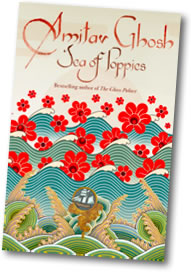I recently read the book Sea of Poppies written by Amitav Ghosh. It is a fictional story written in the backdrop of the Opium wars with China in 1830s.
This is the first book in the Ibis Trilogy. Ibis is an American ship used for slave trade. After American abolished African slave trade in 1808, a British trader buys the ship. He plans to use it to transport indentured labor to Mauritius. Mauritius' sugarcane cultivation was labor intensive. Abolition of slavery caused acute labor shortage. Hence the plantation owners decided to import labor from India.
This journey on Ibis to Mauritius brings together a group of people each one showing a different side of British colonialism.
There is a mulatto American who is on the crew of Ibis as it sails from Baltimore to Calcutta to espace racism. There are the lascars who help with bringing the Ibis to Calcutta and later to Mauritius. There is a chaste king of Raskhali whom the British sentence for forgery and send to Mauritius. There is a high caste lady who married an opium addict and wants to die by Sati but a low caste man saves her. She is on the run and gets into the ship for indentured labors. There is the daughter of French botanist whom a Muslim lady raises and is at home in Bengali customs. When her father dies, she gets into the ship to escape a marriage. These and many other characters all come together in Ibis on the trip to Mauritius.
Through the stories of these people, Ghosh tells us about the opium trade with China. There was great demand for tea, porcelian and silks from China in Britain and Europe. But the British didn't have anything that China liked to trade with them. Because of this, the British had to pay in silver and gold for the trade. They started exporting opium to pay for these goods. The Emporer banned trade of opium as the opium was addicting the Chinese. Even after the ban, opium was being smuggled. To stop it, the chinese captured the ports and destoryed the opium. Opium was one of the biggest revenue generators for the empire. So Britian went to war with China to allow them to trade opium. The Chinese lost this war and in a later opium war had to give away HongKong for lease.
To get all this opium to sell, the British leaned on Indian farmers. They compelled the farmers to cultivate opium by entering into unfair advance contracts. This devasted the farmers as the opium cultivation was uprofitable. The land was being diverted from food crops so they couldn't grow their food anymore. This caused lot of farmers and poor to migrate to Mauritius as slave labor.
It illustrated a part of colonial history I was not familiar with and wanted me to read more. The consequences of all these events are still visible in the world. India is a biggest legal opium producer for pharmaceutical purposes. Mauritius still has a large Indian origin population. China still uses the opium war as insult to national pride.
Ghosh using different languages and dialects was able to make the story real. The book was an easy read and I couldn't put it down. If you have any interest in colonial history, it is a great read.

No comments:
Post a Comment
Comments